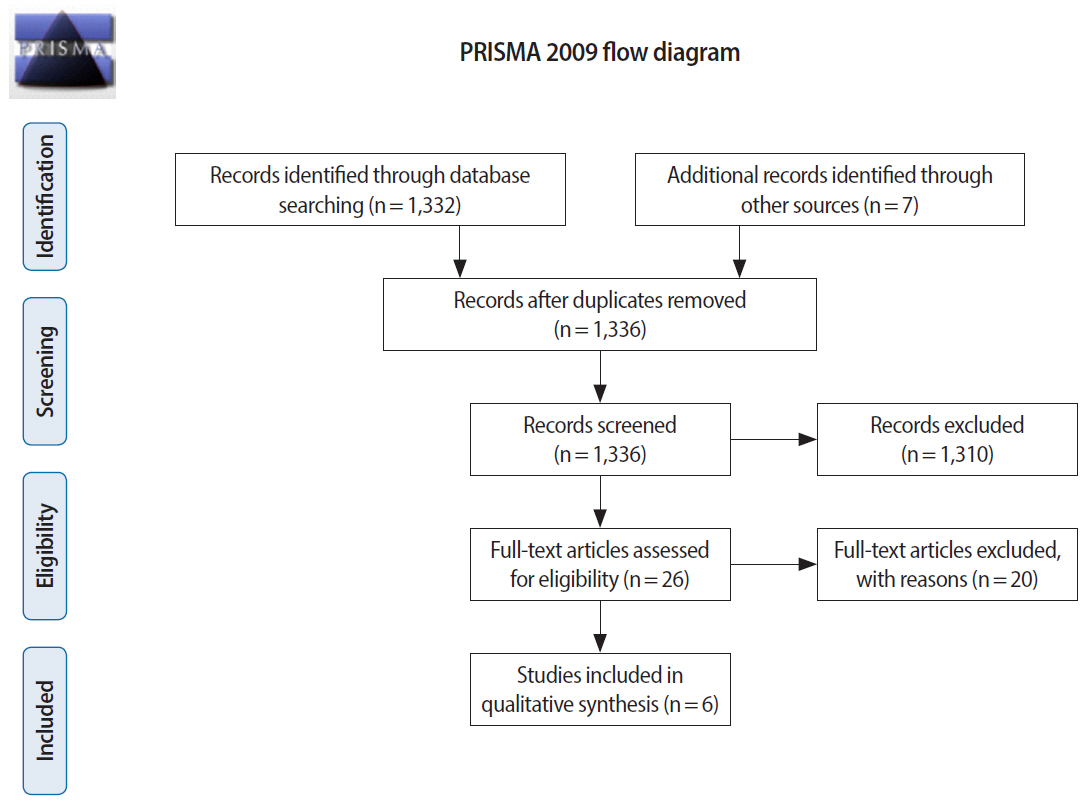J Educ Eval Health Prof.
2016;13:40. 10.3352/jeehp.2016.13.40.
Does emotional intelligence influence success during medical school admissions and program matriculation?: a systematic review
- Affiliations
-
- 1Department of Biology, University of North Carolina, Chapel Hill, NC, USA. cjaegerc@live.unc.edu
- 2Division of Physical Therapy, Department of Orthopedics, Duke University, Durham, NC, USA.
- KMID: 2413789
- DOI: http://doi.org/10.3352/jeehp.2016.13.40
Abstract
- PURPOSE
It aimed at determining whether emotional intelligence is a predictor for success in a medical school program and whether the emotional intelligence construct correlated with other markers for admission into medical school.
METHODS
Three databases (PubMed, CINAHL, and ERIC) were searched up to and including July 2016, using relevant terms. Studies written in English were selected if they included emotional intelligence as a predictor for success in medical school, markers of success such as examination scores and grade point average and association with success defined through traditional medical school admission criteria and failures, and details about the sample. Data extraction included the study authors and year, population description, emotional intelligence I tool, outcome variables, and results. Associations between emotional intelligence scores and reported data were extracted and recorded.
RESULTS
Six manuscripts were included. Overall, study quality was high. Four of the manuscripts examined emotional intelligence as a predictor for success while in medical school. Three of these four studies supported a weak positive relationship between emotional intelligence scores and success during matriculation. Two of manuscripts examined the relationship of emotional intelligence to medical school admissions. There were no significant relevant correlations between emotional intelligence and medical school admission selection.
CONCLUSION
Emotional intelligence was correlated with some, but not all, measures of success during medical school matriculation and none of the measures associated with medical school admissions. Variability in success measures across studies likely explains the variable findings.
Keyword
Figure
Cited by 2 articles
-
What is interesting in the issue 2016 of
Journal of Educational Evaluation for Health Professions?
Yera Hur
J Educ Eval Health Prof. 2016;13:46. doi: 10.3352/jeehp.2016.13.46.A novel tool for evaluating non-cognitive traits of doctor of physical therapy learners in the United States
Marcus Roll, Lara Canham, Paul Salamh, Kyle Covington, Corey Simon, Chad Cook, Sun Huh
J Educ Eval Health Prof. 2018;15:19. doi: 10.3352/jeehp.2018.15.19.
Reference
-
References
1. Ferguson E, James D, Madeley L. Factors associated with success in medical school: systematic review of the literature. BMJ. 2002; 324:952–957. https://doi.org/10.1136/bmj.324.7343.952.
Article2. Mayer JD, Salovey P. What is emotional intelligence?. In : Salovey P, Sluyter DJ, editors. Emotional development and emotional intelligence. New York (NY): Basic Books;1997. p. 3–31.3. Moher D, Liberati A, Tetzlaff J. Preferred reporting items for systematic reviews and meta-analyses: the PRISMA statement. BMJ. 2009; 339:b2535. https://doi.org/10.1136/bmj.b2535.
Article4. Swartz MK. The PRISMA statement: a guideline for systematic reviews and meta-analyses. J Pediatr Health Care. 2011; 25:1–2. https://doi.org/10.1016/j.pedhc.2010.09.006.
Article5. Mayer JD, Salovey P, Caruso D. Mayer-Salovey-Caruso Emotional Intelligence Test (MSCEIT): user’s manual. North Tonawanda (NY): Multi-Health Systems Inc.;2002.6. MacCann C, Roberts RD. New paradigms for assessing emotional intelligence: theory and data. Emotion. 2008; 8:540–551. https://doi.org/10.1037/a0012746.
Article7. Bar-On R. Bar-On emotional quotient inventory: technical manual. North Tonawanda (NY): Multi-Health Systems Inc.;1997.8. Wells GA, Shea B, O’Connell D, Peterson J, Welch V, Losos M, Tugwell P. The Newcastle-Ottawa Scale (NOS) for assessing the quality of nonrandomized studies in meta-analyses [Internet]. Montreal: Faculty of Medicine;[cited 2016 Oct 2]. Available from: http://www.medicine.mcgill.ca/rtamblyn/Readings/The%20Newcastle%20-%20Scale%20for%20assessing%20the%20quality%20of%20nonrandomised%20studies%20in%20meta-analyses.pdf.9. Swinscow TD, Campbell MJ. Statistics at square one. 9th ed. London: BMJ Publishing Group;1997.10. Libbrecht N, Lievens F, Carette B, Cote S. Emotional intelligence predicts success in medical school. Emotion. 2014; 14:64–73. https://doi.org/10.1037/a0034392.
Article11. Doherty EM, Cronin PA, Offiah G. Emotional intelligence assessment in a graduate entry medical school curriculum. BMC Med Educ. 2013; 13:38. https://doi.org/10.1186/1472-6920-13-38.
Article12. Humphrey-Murto S, Leddy JJ, Wood TJ, Puddester D, Moineau G. Does emotional intelligence at medical school admission predict future academic performance? Acad Med. 2014; 89:638–643. https://doi.org/10.1097/ACM.0000000000000165.
Article13. Carr SE. Emotional intelligence in medical students: does it correlate with selection measures? Med Educ. 2009; 43:1069–1077. https://doi.org/10.1111/j.1365-2923.2009.03496.x.
Article14. Chew BH, Zain AM, Hassan F. Emotional intelligence and academic performance in first and final year medical students: a cross-sectional study. BMC Med Educ. 2013; 13:44. https://doi.org/10.1186/1472-6920-13-44.
Article15. Leddy JJ, Moineau G, Puddester D, Wood TJ, Humphrey-Murto S. Does an emotional intelligence test correlate with traditional measures used to determine medical school admission? Acad Med. 2011; 86(10 Suppl):S39–S41. https://doi.org/10.1097/ACM.0b013e31822a6df6.
Article16. Moher D, Liberati A, Tetzlaff J. Preferred reporting items for systematic reviews and meta-analyses: the PRISMA statement. PLoS Med. 2009; 6:e1000097. https://doi.org/10.1371/journal.pmed.1000097.
Article17. Lin M, Lucas HC, Shmueli G. Too big to fail: large samples and the p-value problem. Inf Syst Res. 2013; 24:906–917. https://doi.org/10.1287/isre.2013.0480.
Article
- Full Text Links
- Actions
-
Cited
- CITED
-
- Close
- Share
- Similar articles
-
- Emotional intelligence in medical students: should we be assessing this more vigorously during the admissions process?
- Influence of Clinical Nurse Specialists' Emotional Intelligence on Their Organizational Commitment and Turnover Intention
- The Influence of Emotional Intelligence and Clinical Competency on Organizational Socialization of New Graduate Nurses
- Diversity of Emotional Intelligence among Nursing and Medical Students
- Occupational Stress and Emotional Intelligence in Hospice Volunteers


